Author: Teemu Manninen
The coder’s Latin
30 October 2014 | Articles, Non-fiction

Pleasant interface still? Old book bindings (Merton College library, Oxford, UK). Photo: Wikipedia
Writing is arguably brain-control technology, notes our columnist Teemu Manninen. Writing might not be on its way out, at least not quite yet, he thinks, but the printed book might not stay with us for ever. And would that be a happier world?
When the future of literature is discussed, either here in Finland and elsewhere, topics usually revolve around changes in the economics and practicalities of reading, writing, and publishing: how will writers and publishers get paid, and how can readers find more books to read.
What is taken for granted in these instances is that literature itself will continue to be something that exists in a recognisable way – which itself of course implies that writing itself will remain a viable mass medium for the transmission of information over the transcendent, enormous, unfathomable gulfs of space and time, as it has been for thousands of years. More…
Online, offline?
17 April 2014 | Articles, Non-fiction

‘The bookworm’ (old-fashioned) by Carl Spitzweg, ca. 1850. Museum Georg Schäfer. Photo: Wikimedia
Ebooks are not books, says Teemu Manninen, and publishers who do not know what marketing them is about, may eventually find they are not publishers any more
At least once a year, there is an article in a major Finnish newspaper that asks: ‘So, what about the ebook?’ The answer is, as always: ‘Nothing much.’
It’s true. The revolution still hasn’t arrived, the future still isn’t here, the publishers still aren’t making money. In Finland, the ebook doesn’t seem to thrive. The sales have stagnated, and large bookstores like the Academic Bookstore are closing their ebook services due to a lack of customers.
Why is Finland such a backwater? Why don’t Finns buy ebooks?
The usual explanation is that Finland is a small country with a weird language, so the large ebook platforms like Amazon’s Kindle and Apple’s iBook store have not taken off here. Another patsy we can all easily blame is the government, which has placed a high 24% sales tax on the ebook. If that isn’t enough, we can always point a finger at the lack of devices and applications or whatever technical difficulty we can think of. More…
Decisions, decisions: the fate of virtual literature
28 November 2013 | Articles, Non-fiction
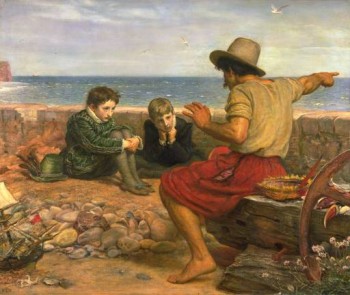
Once upon a time: ‘Boyhood of Raleigh’ by J.E. Millais (1871). Wikipedia
In an era of ‘liveblogging’‚ we are all storytellers. But what’s the story, asks Teemu Manninen
One score of years ago, when the internet was new, the cultural critics of the time were fond saying that it would usher in a new utopia of free distribution of information: we would be able to read everything, know everything and share everything anywhere and every day.
Truly, they told us, we would become enriched by the internet to the point of not knowing what to do with all that wealth of knowledge, the amount of connections between us and the ever-increasing online availability of anyone with everyone, every waking hour.
Now that we really do have this always-on connectivity, you will indeed be available every waking hour: you will update your status, check your inbox, post pics and be available for chatting, texting, a quick email and a message or two, just to make sure no one is offended by your unreachability, since – from experience – a week’s worth of not tweeting or facebooking can make someone think that something serious has happened, or that you don’t even exist anymore. More…
Cut time, paste space
12 September 2013 | Articles, Non-fiction
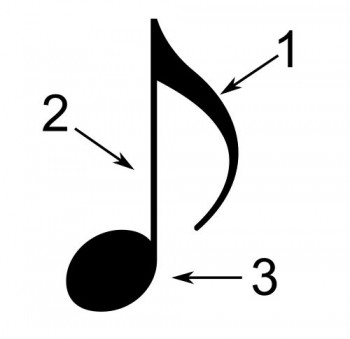
Back to basics. Parts of a musical note. Picture: Wikimedia
How different are the art of words and the art of sounds, author Teemu Manninen ponders, as he unexpectedly finds himself in the role of a musician in a performance. Time, space or both?
Some time ago I got the chance to participate in an unusual concert – as a performer: six players, myself included, were grouped around a table with a triangle in one hand and a glove in the other. Pieces of dry ice and a bucket of water were placed in front of each of us.
The performance began: we took a piece of dry ice and pressed it against the triangle. As the metal cooled, it burned through the ice, releasing gas, which in turn made the metal vibrate very fast. This produced a keening sound that filled the room. More…
Location, location, location
11 February 2013 | Articles, Non-fiction

Before GPS: compass and and gimbal, 1570. Picture: Wikimedia
Art that requires navigation systems? Whatever next. In his column poet and writer Teemu Manninen wonders whether literature can function as ‘locative’. How to blend technology and art? Perhaps literature too might expand from the printed word
What if the Romantic poet John Keats had never published his poetry in print – if his works had been distributed only in manuscript form and read only by his friends and acquaintances? Had that been the case, the only way of hearing his poetry would have been at the salons and informal clubs that took place in literary people’s homes, at coffee houses, or other meeting places.
Keats might not even have, most likely, been in attendance himself, but maybe someone had a copy of a copy of a fragment of a poem that they might read to the gathered intellectuals and gentlefolk. You would have to have known the right people, have to have been at the right place at the right time to hear ‘Ode to a Nightingale’ read for the first and perhaps for the last time ever.
Or, what if Joyce had never intended for Ulysses to be published for the great reading public at all? What if, instead, he had left copies of each chapter around Dublin in the places where those chapters take place; what if, page by page, he had distributed his work in the actual locations of the events as they happened in his imagination? More…
Pen to paper
25 October 2012 | Articles, Non-fiction
Writing is ancient: the act of taking a stylus, a quill or a pen into one’s hand still feels powerful. Will we find a way of scrawling in space, to mark our individuality, wonders Teemu Manninen
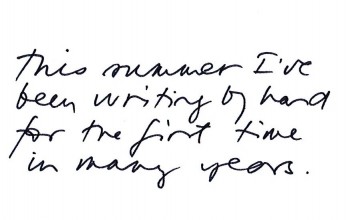
It was my vacation, and I wanted to catch up on some fun writing projects, but because I didn’t want to depend on my devices (would we have wifi? would the batteries last?) or carry around too much extra stuff I bought a red notebook and wrote in black ink on white paper while sitting in cafes and restaurants with my wife.
Writing by hand got me – surprise – to thinking about handwriting in general. Etymologically, ‘writing’, from Old English writan, means scratching, drawing, tearing. In the original Hebrew, God does not simply fashion humans out of clay, he writes them: his word is his image, giving life to the letter of his meaning, the human being.
Writing is violence. It brings about vivid change in the matter of the world: in the age of clay tablets, the stylus was a carving instrument. During the age of ink, cutting the tip of the quill was, if we believe the early Renaissance manuals of handwriting, as precise and violent an act as cutting someone’s head off. More…
So many words
25 April 2012 | Articles, Non-fiction
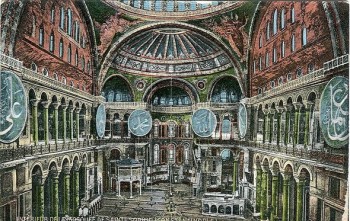
Hagia Sofia, Istanbul: from basilica to cathedral to mosque to museum. Postcard, c. 1914. Photo: Wikipedia/Xenophon
Sacred spaces, repositories of free speech, places of healing? Teemu Manninen awaits the day when libraries become virtual, enabling anybody to visit them, without having to travel across land and sea
The Bodleian Library in Oxford, the Vatican Library, the Bibliotheque Nationale in Paris, New York Public Library, the British Museum Reading Room, the Real Gabinete Portugues De Leitura in Rio De Janeiro, the Library of Congress and the National Library of Finland.
What do all of these have in common, except the obvious fact that they are all famous libraries? To put it another way: why are these famous libraries so famous?
It is not because they have books in them, although that has become one of the main tasks of the library system in the modern world. But a library is not simply an archive. If we in the West are a culture of the book – a culture of the freedom of information and expression – then a library is the architectural incarnation of our way of life: a church built for reading. More…
Out of my hands
10 November 2011 | Articles, Non-fiction

Who's been eating my porridge? From ‘English Fairy Tales’ by Flora Annie Steel (1918), illustrated by Arthur Rackham. The Project Gutenberg e-Book
In the classic fairy-tale, on finding their belongings were not as they had left them, the three bears exclaimed: ‘Who’s been eating my porridge?’ When our technology correspondent Teemu Manninen found someone else’s underlinings in the electronic text he was reading, he wondered: ‘Who’s been tampering with my ebook?’ Which led him to ponder how similar books and their virtual counterparts really are – and could his ebook really be called ‘his’?
A few months ago I was reading an ebook on my iPad when I came across an underlined passage. For a moment I felt strangely disturbed. My initial thought was that I had not made the underlining, and therefore this had to be a glitch, an error in the computer program that was the book, which meant that there was something wrong with my book. What made this thought disturbing was the realisation that the kinds of harm that can befall digital books – and the measures that one can take to prevent them – are no longer ‘in my hands’: that the book is no longer physical, but virtual. More…
Head in a cloud
27 May 2011 | Articles, Non-fiction
Thinking, reading, writing, buying… Teemu Manninen explores the new freedoms, literal and poetic, offered by cloud computing, where what you can do is no longer limited by what you happen to have on your computer

High in the sky: cumulus clouds. Photo: Michael Jastremski, Wikimedia
I’m sitting in a rocking chair on the porch of a cottage by a lake. My fingers tap and slide on the surface of a black glass panel, a kind of instrument used in the composing of literature. Each tap equals a letter, a series of taps equals a word, a symphony of taps becomes a paragraph, a paragraph an essay.
The glass panel remembers these letters and words and the writings they become, and knows them by their names, but it could also record anything I see or hear. I could even talk to it and it would understand my commands, as if some nether spirit were captured inside, a magic genie slaved to do my bidding. More…
The pirate’s friend
11 March 2011 | Articles, Non-fiction
Intellectual property was hot stuff half a millennium ago, and not much has changed: Teemu Manninen takes a look at piracy and mercenaries in the age of electronic books

Sir Fulke Greville, 1st Baron Brooke (1554–1628) by Edmund Lodge. Photo: Wikimedia
In November 1586 Fulke Greville (later 1st Baron Brooke) sent Queen Elizabeth’s spymaster Sir Francis Walsingham a letter complaining about some ‘mercenary printers’‘ plans to print the romance novel Arcadia written by his friend (and Walsingham’s son-in-law) Sir Philip Sidney, who had died that very same year. This ‘mercenary book’ needed to be ‘stayed’, i.e. censored by the authorities, so that Sidney’s friends and relatives might take control, and also because publishing his works without consulting Greville or someone close to Sidney might damage his reputation or even his ‘religious honors’.
I rehearse this ancient tale because of its exemplary value for us today. From our point of view there seems nothing extraordinary about Greville’s actions: he is seeking to defend his friend’s literary estate from ‘mercenaries’ who steal intellectual property (IP): pirates. More…
One-night stand: an interview with publisher Leevi Lehto
17 September 2010 | Interviews
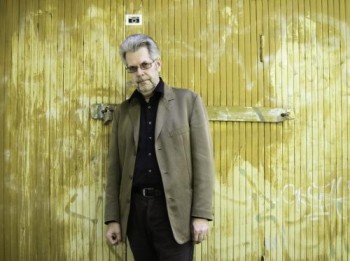
Leevi Lehto. Photo: Lotta Djupsund/Savukeidas
Founded by poet Leevi Lehto, ntamo is seen by many as the black sheep and enfant terrible of the world of Finnish publishing.
From its inception, ntamo (shortened from the word kustantamo, publishing company) has striven to subvert the familiar conservative models of publishing that audiences are used to.
Ntamo publishes books for small circulation, such as poetry and experimental prose. Its catalogue includes works both by celebrated writers, such as Kari Aronpuro, and by a whole host of authors making their literary debuts.
Lehto’s objective has been to publish as many books as possible, using a system of print on demand, and to have as little to do with the books’ content as possible. What’s more, ntamo’s publications are not marketed at all. Readers can find information on new publications by following the publisher’s blog [in Finnish only]. I met up with Lehto a while ago and we discussed ntamo’s current situation, new trends in the publishing world and the future of books and literature in general. More…
On reading, books and horses
4 June 2010 | Articles, Non-fiction
Horses, women, cars, men and reading: Teemu Manninen takes a look at the changes that illogical history makes
I have a friend who is an avid reader and who also talks about the books he reads. But being a staunch conservative when it comes to reading habits, I just cannot consider him a true friend of literature. The reason: he only reads non-fiction books. To me, ‘being a reader’ means reading fiction and poetry.
But increasingly it seems that real literature is becoming more and more marginal, whereas non-fiction (self-help, history, travel guides, popular science, popular economics, cookbooks) is what sells and keeps the industry afloat. The recent Finnish ‘essay-boom’ is an example of this development, with young writers like Antti Nylén or Timo Hännikäinen gaining recognition as important contemporary authors solely through their work as essayists; Hännikäinen has also written poetry, but Nylén is strictly a non-fiction writer. More…
Second nature
15 February 2010 | Articles, Non-fiction
 We hear a lot about how the internet is going to transform the reading and the marketing of books. But what about the act of writing? Teemu Manninen reports from the frontline of a new generation of authors for whom life has always been digital
We hear a lot about how the internet is going to transform the reading and the marketing of books. But what about the act of writing? Teemu Manninen reports from the frontline of a new generation of authors for whom life has always been digital
When we think of the future of publishing in these times of electronic reading devices, audiobooks, and the internet, when it seems as if the whole material being of literature is about to be transformed, we may ask how the marketing of books will change.
What happens when publishing goes online? How will authors cope with the new culture of the internet? More…
What’s so great about paper?
17 September 2009 | Articles, Non-fiction

High-tech: the ultimate gadgets of the 15th century, parchment and pen. A portrait of Jean Miélot, the Burgundian author and scribe, by Jan Tavernier (ca. 1456)
The day will soon come when commuters sit on a bus or train with their noses buried in electronic reading devices instead of books or newspapers. Teemu Manninen takes a look at the digital future
Most people interested in books are aware of the arrival of electronic reading devices such as the Amazon Kindle, a kind of iPod — the immensely popular portable music listening device made by the company Apple — for electronic books. For a literary geek like me, the Kindle and e-readers should be the ultimate gadget: a whole library in a small, paperback-sized device. However, I’ve been wondering why digital reading hasn’t become as popular as digital listening. I myself have not invested in an e-reader, although I ought to be exactly the desired kind of customer. After all, I read all the time. Even the mp3 player I have is mostly used for listening to audio books. More…


